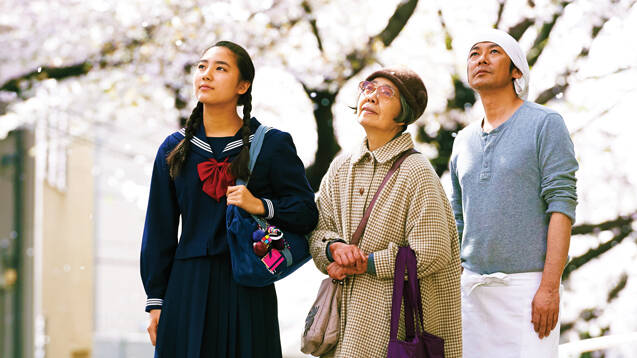“Clank, clank, clank.” The youngish but ragged and weary Sentaro clangs his way step by step down from his tiny apartment in the pre-dawn bluish mist to the tiny pancake shop, the sad center of his empty life. Yet it’s a lovely little Tokyo neighborhood blessed with cherry blossom trees, a transit line, gardens and just enough customers, including three regular schoolgirls, to buy the pancakes he painstakingly pours and flips on his grill.
His routine shifts when he reluctantly hires Tokue, a bent, little old lady with bright eyes and a perpetual smile to help him. In a turning point for what was looking like a plotless examination of Sentaro's routine, she teaches him to make a marvelous bean sauce to spread on the pancakes; and here the director (Naomi Kawase) inserts a spiritual biography of the beans with sparkling streams, planting and birth under warm sun, and harvest and delivery to the shop to be nourished, flavored, tenderly cooked and served.
One morning Sentaro clanks down the stairs a little late to discover that Tokue has already arrived, cooked the pancakes and beans and is serving the gathered smiling customers. These two apparently very different people bond; Tokue will stay. At about this time the film viewer is tempted to call out, “When will something happen?”
Well, it does. Among the steady customers are the schoolgirls plus an older girl, Wakana, whose personal pet is a beautiful yellow song-bird. One of the girls asks Tokue what happened to her hands—the hands and wrists are gnarled, red and lumpy. Tokue deliberately does not hear the question, and we next see the girls in their school library reading up on leprosy. Word spreads, rumors fly and the wife of the shop owner tells Sentaro that Tokue must go.
Now, based on the novel An by Durian Sukegawa, “Sweet Bean” becomes a story about other things: the life secrets that unite us but we do not share; the boundaries of law or superstition or prejudice that separate groups who should accept and care for one another; the spirits that inhabit the trees, plants and the sun and moon above, which will unify us if we will allow them. Young Wakana has been forced out of her apartment because no pets are allowed and she will not sacrifice her bird. She brings it as a gift for Tokue who has returned to her leprosarium outside town.
“Sweet Bean” has much to offer, beautiful without being powerful, religious without either churches or God, sentimental without being soupy. Toward the end Sentaro will weep; the audience may or may not. It may help to know that to write the film Kawase isolated himself in a library on the property of a leper sanatorium on the outskirts of Tokyo. And it should help us all to confront our own pasts, the secrets and tragedies that, because we have allowed them to, may have cut us off from those we should love.
"Sweet Bean" opens in select cities on Friday March 18.
Raymond A. Schroth, S.J., is literary editor of America.








